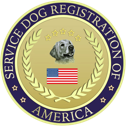Can You Take a Service Dog to School? What to Know
2020-12-14
Performing basic, everyday tasks may present an added challenge for those that live with a disability. Things like going shopping or going to work may be a bit more difficult. However, many useful aids and accommodations have been developed to help people maintain their independence and perform tasks such as these.
Service animals offer the support needed to get through challenging tasks. They are great aids for individuals who have a disability and need help completing physical tasks. Service animals are trained to do the work and help their owner with specific needs. They are highly skilled since they must go through hours of training sessions.
A commonly asked question pertaining to service animals is whether owners can take them to school. There are protections that allow them in the workplace, however, does this hold true in schools as well?
Can Service Dogs Be Taken to School?
In all cases, service dogs are to be allowed on school campuses to help their owners achieve a level of independence and security in a world that caters to those without disabilities. Service animals serve an important purpose and provide emotional support and physical assistance to their owners, which is a big reason why service dogs are protected and permitted on campus.
Students of any age who have a disability deserve the right to have their service dog with them throughout the school day, and school districts are required to acknowledge these needs. Since service dogs are allowed on campus, the school officials have to cater to both the student and the working animal’s needs.
These modifications to the basic school procedure help protect students and their service dogs by guaranteeing their right to independence in the classroom setting.
While officials have to consider the needs of the other students who are attending the school, they have to make things work so that students who have disabilities can learn and that their service dogs can complete their job without anything or anyone interfering.
The Laws Regarding Service Dogs in School
While basic law protects service dogs and grants them access to these public schools and institutions, there are some things to know about how these laws work in practice and what protections service dogs and their owners have.
The Americans with Disabilities Act (ADA)
For starters, it is important to recognize that service animals are protected and supported by legislation all throughout the United States. Services dogs are ultimately safeguarded under the Americans with Disabilities Act (ADA). This act was put in place to allow service dogs to help and fulfill responsibilities for their owners in most public places.
Consequently, it requires public places to modify or change their traditional procedures to meet the needs of those with disabilities. This act’s protections carry over into the school setting and allow service dogs on campuses worldwide to help students who need it.
Service Dog Laws for K – 12 and Public Schools or Universities
In addition to the Americans with Disabilities Act, there are also other acts that prevent any other discriminatory actions against students with service animals. These include:
Regardless of a student’s age or grade level, there are pieces of the law designed to fulfill the needs of their specific disability and how a service animal could help them.
K-12 schools, for example, may have different procedures regarding service animals than a college or public university. That being said, the animals are still to be permitted on any publicly or federally funded campus so that they can work side by side with the student that has registered the animal.
Qualifications for Service Dogs
In order for a dog to be considered a fully-functioning and trained service dog, the owner must prove that the animal is suited to perform designated tasks that can help with their disability and that live up to the standards written out in the ADA.
A service dog’s main qualifications require the following:
- They are helping their owner, the student, to perform tasks that would otherwise be impossible to do alone or without assistance.
After the owner has covered these basics, the laws that are put in place will require the schools to take over and make sure that the animal can function and complete its job while on the campus and that a student’s disability is acknowledged and accounted for.
Laws tend to vary based on the school district, especially with younger students, depending on whether the school is a public or private organization. As mentioned above, schools that receive money from public funds are required to follow the ADA rules and comply with whatever you may need to have your service animal with you.
In addition to service dogs, other service animals may be protected by these laws. Service dogs are more common, though the term ‘service animal’ can be applied to various species.
Regardless of whether you have a service dog or other service animal, students must know that they are protected and are allowed to have this help even while in the school setting. These animals provide both physical and emotional support and are protected to help students succeed in their educational endeavors.
Protections
Public institutions are not allowed to discriminate against students that have a disability or for having a service dog. Service animals are there to perform a specific job, and campus leaders must allow them to do so.
If you or your child have a service dog with you while at school, you should always be aware of the legal protections you have and to make sure that you and your animal are granted those securities any time you are on the school campus.
It is important to note that if you are looking to register your service dog you can receive timlet emails on changes to local laws.
Conclusion
Having a service dog to assist you with your disability is meant to help you in all walks of life. Going to school and getting an education is a right and having a service dog to help you through is also a just cause. It is important to recognize these laws and that service dogs have protections even in the school system.
